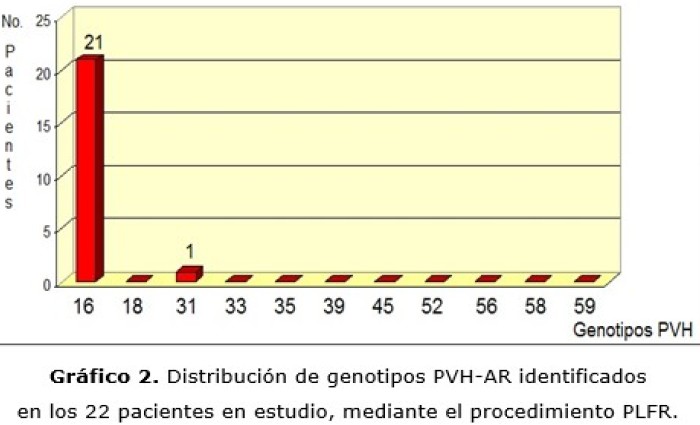Molecular identification of human papilloma virus genotypes in patients with cervical cancer
Abstract
Background: it is demonstrated that the main cause of cervical cancer is high risk humanp virus. There is no precedent of molecular studies for the typing of Human Papilloma Virus in the population of Camagüey. Polymerase chain reaction is Molecular Biology technique that has been used traditionally for the clinical diagnosis and other purposes. This technique allows confirming the presence of papillomavirus´DNA in the total extracted DNA, from samples of patients with cervical cancer.
Objective: to demonstrate for the first time existing high-risk human papilloma virus genotypes that cause cervical cancer in female population of Camagüey, Cuba.
Methods: a prospective analytic study was conducted, in which 22 female patients of the province of Camagüey were studied. They received medical attention at Ana Betancourt Hospital. Identification and typing of the Human Papilloma Virus genotypes was carried through the molecular procedure Restriction Fragment Length Polymorphism.
Results: patients who presented exophytic lesions accounted for 63, 6%, 4, 5 % had endophytic type, and 31, 8 % presented other types. This study confirmed that high-risk Human Papilloma Virus genotypes existing in the province of Camagüey are genotypes 16 and 31, and the most frequent is 16.
Conclusions: this research is the first report of a molecular study of Human Papilloma Virus from samples of patients with cervical cancer in the province of Camagüey, Cuba. These results, along with the ones obtained by other authors, make an important contribution in the design of the increasingly effective therapeutic and preventive vaccine to an anticipated solution to cervical cancer in Cuba.
DeCS: POLYMERASE CHAIN REACTION; POLYMORPHISM, RESTRICTION FRAGMENT LENGTH; HUMAN PAPILLOMAVIRUS 16; UTERINE CERVICAL NEOPLASMS; ANALYTIC SAMPLE PREPARATION METHODS.
Downloads

Published
How to Cite
Issue
Section
License
Copyright (c) 2016 Juan Carlos Piña Napal, Gustavo Crespo Campos, Rafael Fando Calzado, Gabriel Casanova Corona, Mileidy Curbelo Toledo, María Mercedes Guerra Rodríguez

This work is licensed under a Creative Commons Attribution-NonCommercial 4.0 International License.
Copyright: Camagüey Medical Archive Magazine, offers immediately after being indexed in the SciELO Project; Open access to the full text of the articles under the principle of making available and free the research to promote the exchange of global knowledge and contribute to a greater extension, publication, evaluation and extensive use of the articles that can be used without purpose As long as reference is made to the primary source.
Conflicts of interest: authors must declare in a mandatory manner the presence or not of conflicts of interest in relation to the investigation presented.
(Download Statement of potential conflicts of interest)
The Revista Archivo Médico de Camagüey is under a License Creative Commons Attribution-Noncommercial-No Derivative Works 4.0 International (CC BY 4.0).
This license allows others to distribute, to mix, to adjust and to build from its work, even for commercial purposes, as long as it is recognized the authorship of the original creation. This is the most helpful license offered. Recommended for maximum dissemination and use of licensed materials. The full license can be found at: https://creativecommons.org/licenses/












 22 julio 2025
22 julio 2025